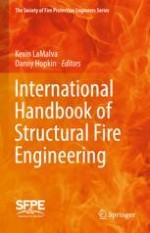2021 | OriginalPaper | Chapter
7. Steel and Composite Structures
Authors : Anthony Abu, Ruoxi Shi, Mostafa Jafarian, Kevin LaMalva, Danny Hopkin
Published in: International Handbook of Structural Fire Engineering
Publisher: Springer International Publishing
Activate our intelligent search to find suitable subject content or patents.
Select sections of text to find matching patents with Artificial Intelligence. powered by
Select sections of text to find additional relevant content using AI-assisted search. powered by
